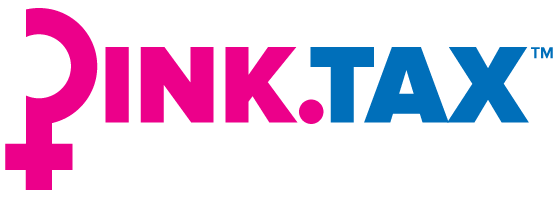
 FAQ
FAQ
Frequently Asked Questions - Just the Basics!
What is the Pink Tax?
The Pink Tax refers to the phenomenon whereby goods and services cost more for females than males for no good reason.
The culprits include service providers, marketers and sellers of consumer goods (a lot of those goods and their packaging have pink on them), state governments, and the U.S. government. Sadly, the Pink Tax also happens to be a global phenomenon that rears its ugly head in many parts of the world.
Don’t Women Earn Less Money Too?
Yes.
For example, studies show that on average, women working full time in the United States are paid just 80% of what men earn. This is a related but separate phenomenon called the “Gender Pay Gap”. Because women earn less and pay more, it’s a double whammy.
Is the Pink Tax Real?
Yes.
Studies and investigations undertaken by universities, media organizations and governmental bodies have repeatedly demonstrated that razors, dry cleaning, clothes, haircuts, toys, and a myriad of other goods and services marketed by gender routinely cost more for females than males.
Isn’t Pink a Feminine Color?
No.
Society's current association of pink with females and blue with males is simply the result of decades of successful marketing campaigns by businesses who leverage gender color-coding to increase sales.
Aren't There Good Reasons for Some Things Costing More for Women Than Men?
There certainly can be good reasons for price differentials in a free market. Where the cost of producing a good or providing a service specially designed for females is greater, a higher price can be justifiable.
Doesn't the Free Market Ensure that Price Differentials Arise Solely from Competitive Market Conditions Such as a Higher Cost of Providing the Service or Producing the Good in Question?
No.
A perfect market would theoretically achieve that result, but in the real world free markets are imperfect. Free markets can also be distorted through advertising campaigns which, instead of conveying important information about the product, prey on peoples’ emotions and insecurities (“If you want to be a pretty princess, buy this pink dress!”).
Can Laws Be Passed to Eliminate the Pink Tax?
Yes.
Already, New York City, Miami-Dade county in Florida, and the entire state of California prohibit gender-based pricing in services. For example, in these jurisdictions you can't be charged more for a haircut just because you're a female, or charged more for dry cleaning just because your shirt has buttons on the left ("female") instead of the right ("male"). However, these jurisdictions allow higher prices to be charged where providing the service involves more time, difficulty, or cost – just as a free market should.
Is the U.S. Government Partly Responsible for the Pink Tax?
Yes.
Uncle Sam imposes different levels of import taxes (technically “customs duties”) on a variety of apparel and footwear based solely on the gender of the intended wearer. At the same time, the United States imports the vast majority of those goods from foreign countries. Since sellers in a free market must pass along all costs and then tack on a profit margin in order to stay in business, this means different retail prices for men’s and women’s apparel and footwear are partly attributable to gender-based discrimination by the U.S. government.
Is the U.S. Government Currently Doing Anything About the Pink Tax?
No.
In July 2016, a bill entitled “The Pink Tax Repeal Act” (H.R.5686) was introduced in the 114th Congress. The proposed legislation sought to outlaw the Pink Tax nationwide on both consumer goods and services. In December 2016 a bi-partisan congressional committee published a detailed report condemning the Pink Tax. However, the 114th Congress allowed H.R.5686 to die on the vine. The Pink Tax Repeal Act bill was reintroduced into the 115th Congress in April 2018 (as H.R.5464) but once again it died on the vine with no progress made beyond its introduction and referral on the same day to the House Committee on Energy and Commerce.
IT'S TIME FOR CONGRESS TO STOP GRANDSTANDING ON THIS ISSUE!
IN ORDER TO GET FEDERAL PINK TAX LEGISLATION PASSED AND START MAKING MEANINGFUL NATIONWIDE PROGRESS, CONGRESS MUST REINTRODUCE THE PINK TAX REPEAL ACT WITHOUT EXTENDING THE PROHIBITION TO CONSUMER GOODS.
RESTRICTING THE INITIAL LEGISLATION TO SERVICES SUCH AS HAIRCUTS AND DRY CLEANING WILL GIVE THE LEGISLATION A DECENT CHANCE OF GARNERING WIDESPREAD BIPARTISAN SUPPORT.
AT THIS EARLY STAGE OF THE ANTI-PINK TAX MOVEMENT, INCLUDING A PROHIBITION ON GENDER-BASED PRICE DIFFERENTIALS ON CONSUMER GOODS WILL DOOM THE LEGISLATION EVERY TIME.
IT'S TIME FOR ALL AISLES OF CONGRESS TO STEP UP, PICK THE LOW HANGING FRUIT, AND PASS LONG OVERDUE FEDERAL LEGISLATION PROHIBITING PURELY GENDER-BASED PRICING IN SERVICES ACROSS THE LAND.
THE PRICE OF HAIRCUTS SHOULD DEPEND ON WHAT'S ON YOUR HEAD, NOT WHAT'S IN YOUR PANTS!
Why Does  Believe That Federal Legislation Prohibiting Gender-Based Pricing Nationwide Should Be Limited to Services and Not Encompass Goods?
Believe That Federal Legislation Prohibiting Gender-Based Pricing Nationwide Should Be Limited to Services and Not Encompass Goods?
Because that’s the best possible way to get any sort of nationwide Pink Tax legislation enacted.
The Pink Tax Repeal Act died in the 114th and 115th Congresses because the proposed legislation bit off more than it could chew. It might well have succeeded had it not sought to outlaw the Pink Tax on consumer products as well as services.
Prohibiting gender-based pricing of services is straightforward from a legislative and enforcement perspective because it’s easy to identify the responsible party in full control of the price. For example, if a hair salon charges higher prices for women’s haircuts, the government can send a notice to the salon threatening the imposition of a fine, and the salon owner can then change the pricing strategy so different prices arise from legitimate market factors like the amount of time it takes to cut someone’s hair as opposed to what kind of chromosomes someone has.
On the other hand, prices of consumer goods are not determined exclusively by retail sellers. Instead, the retail price at which a seller can earn a profit is substantially determined by various hidden upstream players in the supply chain (such as manufacturers, importers, and sometimes even the U.S. government itself). This makes the Pink Tax on goods much more difficult to remedy through legislation because to be market-friendly, enforceable, and just, laws must be able to identify and punish the parties who are directly and primarily responsible for prohibited behavior.
What is the Tampon Tax?
The Tampon Tax is a species of the Pink Tax that involves governmental taxation of feminine hygiene products. In its more objectionable form involving overt gender discrimination, some U.S. states exempted male-oriented medical care products like Rogaine (which fights male baldness) from state sales taxes, while not exempting feminine hygiene products. Some states have taken action to rectify this discrimination by extending the exemption to feminine hygiene products as well.
Some Tampon Tax protesters also believe that feminine hygiene products should be exempt from all taxation regardless of whether any products designed exclusively for males are exempt. In 2015, Canada signed on to this view and exempted feminine hygiene products from most federal taxation in that country.  thinks that states across the nation and the U.S. federal government should follow suit.
thinks that states across the nation and the U.S. federal government should follow suit.
Is Fighting the Pink Tax a Left-Wing Issue?
No.
Thoughtful people across the political spectrum agree that things should not cost more just because they are made for or provided to someone of a specific gender.
Is the Pink Tax a Global Issue?
Yes.
News articles addressing local Pink Tax problems have been published in Europe, the Middle East, Canada, Australia, and elsewhere.
Does the Pink Tax Also Hurt Males?
Yes.
Males don’t like price (or any other) discrimination aimed at their mothers, grandmothers, sisters, wives, daughters, girlfriends, friendgirls, etc. Furthermore, a 2015 study of gender-based pricing of consumer goods conducted by New York City’s Department of Consumer Affairs found that 18% of the time retail goods marketed to males cost more than similar goods marketed to females, which means gender price discrimination sometimes directly impacts males even though it mainly hurts females. Males are also direct victims of the Pink Tax because the color pink has been stolen from their carefree enjoyment.
Aren’t There More Genders Than Just Male and Female?
This is an important debate in today’s society, and peoples’ views differ.
However, there is no meaningful debate about whether the Pink Tax exists. Broader questions about gender identity are beyond the scope of  .
.
What Can I Do to Help Fight the Pink Tax?
Women and girls, use your voice and vote with your purse and your pen! If you live in California, Miami-Dade county, or New York City, complain to your hairdresser or dry cleaner if they charge you higher prices and tell them it’s against the law. You can also report offenders to the government which will take enforcement action and make sure the illegal gender discrimination stops. For female readers who don’t live in one of these jurisdictions, make the same complaints even though gender-based pricing of services is not against the law where you live (yet). For consumer goods like razors, shampoo, cologne, etc., compare prices and shop in the men's aisle if items there suit your purposes and cost less. Complain to the retailer and send an email or letter to the manufacturer of an item offered for sale with a Pink Tax mark-up (an email and/or physical mailing address can be found on virtually every package of any good you buy). Finally, contact your local, state, and federal elected officials to let them know that something needs to be done to end the Pink Tax.
Men and boys, man up! Recognize and acknowledge that the Pink Tax is a serious and widespread phenomenon that harms the females in our lives. That it also does bad things directly to males like steals their right to full enjoyment of a beautiful color in the rainbow. That you don’t like how it feels when you're discriminated against because you’re male. That you can and should do all the central things females can do to stop the discrimination and yes, this does mean complaining when your haircut costs less – tough luck. So go ahead, you too use your voice, pen and wallet (or man purse if you've got one) to help fight the Pink Tax – there’s nothing feminine about it.
What If We Don’t Succeed in Stopping the Pink Tax?
We must succeed, and we will succeed.
The timing is right as society is slowly but steadliy opening its doors to full participation in life's opportunities regardless of gender.
And while change doesn't come without a fight, bear in mind the words of encouragement from Frederick Douglass, who escaped slavery in 1838 and went on to become one of the greatest forces for positive social change this country has ever seen. A brilliant author, orator, abolitionist, and staunch supporter of women’s rights, he offered this eternal kernel of wisdom: “If there is no struggle there is no progress.”
Wait – What About the #MeToo Movement?
This website focuses on economic discrimination and what we can do to combat it – dollars and change, so to speak. Despite how wrongful the Pink Tax is, nobody’s going to jail or forfeiting a job or career over it.
Conversely, sexual harassment is serious criminal conduct and far more harmful to women than the financial discrimination this website aims to help rectify.
That said, the #MeToo movement and the fight against the Pink Tax are both components of the broad struggle for female emancipation that we are witnessing on many levels in the U.S. and other countries across the globe. It’s truly an exciting time.